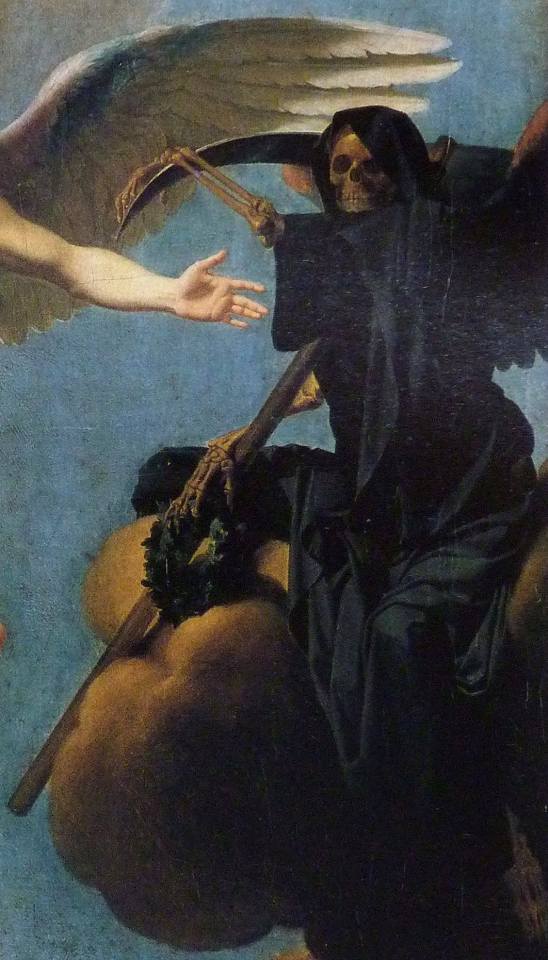#Liberté ou La Mort
Text
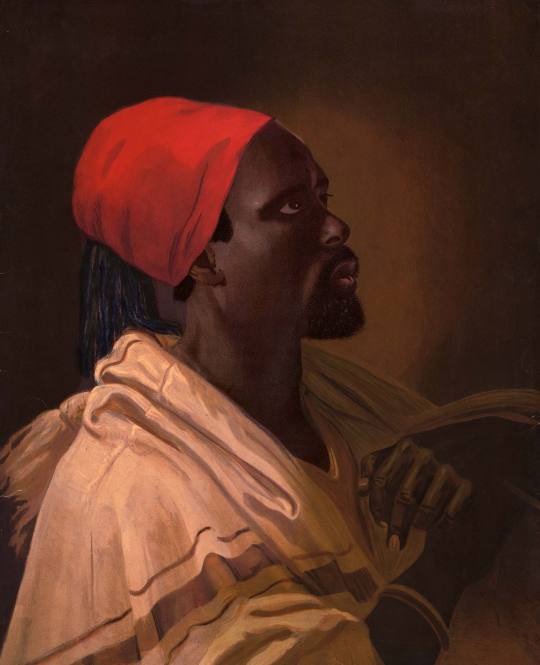
Toussaint L'Ouverture by George De Baptiste.
#George De Baptiste#haiti#République d'Haïti#Repiblik d'Ayiti#french revolution#jacobins#haitian revolution#Révolution haïtienne#Révolution française#black lives matter#Liberté ou La Mort
130 notes
·
View notes
Note
Give me the last words of every figure that had a role in the French revolution
(Maybe it will be to many so you can give a little of if you want)
Louis XVI — on January 22 1793, Suite du Journal de Perlet reported the folllwing about the execution that had taken place the day before:
[Louis] climbs the scaffold, the executioner cuts his hair, this operation makes him flinch a little. He turns towards the people, or rather towards the armed forces which filled the whole place, and with a very loud voice, pronounces these words:
“Frenchmen, I die innocent, it is from the top of the scaffold, and ready to appear before God, that I tell this truth; I forgive my enemies, I desire that France…”
Here he was interrupted by the noise of the drums, which covered some voices crying for mercy, he himself took off his collar and presented himself to death, his head fell, it was a quarter past ten.
Jean-Paul Marat — several people who came to witness during the trial of Charlotte Corday reported Marat’s last words to have been a cry for help to his fiancée Simonne Évrard:
Laurent Basse, courier, testifies that being on Saturday, July 15 (sic), at Citizen Marat's house, between seven and eight o'clock in the evening, busy folding newspapers, he saw the accused come, whom citoyenne Évrard and the portress refused entrance. Nevertheless, citizen Marat, who had received a letter from this woman, heard her insist and ordered her to enter, which she did. A few minutes later, on leaving, he heard a cry: ”Help me, my dear friend, help me!” (À moi, ma chere amie, à moi !). Hearing this, having entered the room where citizen Marat was, he saw blood come out of his bosom in great volumes; at this sight, himself terrified, he cried out for help, and nevertheless, for fear that the woman should make an effort to escape, he barred the door with chairs and struck her in the head with a blow; the owner came and took it out of his hands.
The president challenges the accused to state what she has to answer. I have nothing to answer, the accused says, the fact is true.
Another witness, Jeanne Maréchal, cook, submits the same facts; she adds that Marat, immediately taken from his bathtub and put in his bed, did not stir.
The accused says the fact is true.
Another witness, Marie-Barbe Aubin, portress of the house where citizen Marat lived, testifies that on the morning of July 13, she saw the accused come to the house and ask to speak to citizen Marat, who answered her that it was impossible to speak to him at the moment, attenuated the state where he had been for some time, so she gave a letter to deliver to him. In the evening she came back again, and insisted on speaking to him. Aubin and citoyenne Évrard refused to let her in; she insisted, and Marat, who had just asked who it was, having learned that it was a woman, ordered her to be let in; which happened immediately. A few moments later, she heard a cry: "Help me, my dear friend!” (À moi, ma chere amie !);she entered, and saw Marat, blood streaming from his bosom; frightened, she fell to the floor and shouted with all her might: À la garde! Au secours !
The accused says that everything the witness says is the most exact truth.
Girondins — Number 64 of Bulletin du Tribunal Criminel, written shortly after the execution, reports that, once arrived at Place de la Révolution, the Girondins sang Veillons au Salut de l’Empire together while waiting for their turn to mount the scaffold. Lehardy’s last words are reported to have been Vive la République, ”which was generally heard, thanks to the vigorous lungs nature had provided him with.”
Hébertists — On March 31, a week after the execution, Suite de Journal de Perlet reported the following anecdote, though I’ll let it be unsaid whether it should be taken seriously or not:
Here is an anecdote which can serve to make better known the eighteen conspirators whom the sword of the law has struck. On the day of their execution, several heads had already fallen when General Laumur's turn arrived. Ronsin and Vincent looked at him at the scaffold and said to Hébert: ”Without the clumsiness of this j... f... we would have succeeded.” They were alluding to the indiscretion of Laumur, who would tell anyone who would listen that the Convention had to be destroyed.
In Mémoires sur Carnot par son fils (1861), Carnot’s son also claims that, on the day of the execution, his father got stuck in the crowd witnessing the tumbrils pass on their way to the scaffold, close enough to hear Cloots say: “My friends, please do not confuse me with these rascals.”
Dantonists — the famous idea that Danton’s last words were: ”show my head to the people, it’s worth seeing” is, according to Michel Biard, at best backed by a dubious source — Souvernirs d’un sexagénaire (1833) by Antoine Vincent Arnault:
I found there all the expression of the sentiment which inspired Danton with his last words; terrible words which I could not hear, but which people repeated to each other, quivering with horror and admiration. ”Above all, don't forget,” he said to the executioner with the accent of a Gracque, ”don't forget to show my head to the people; it’s worth seeing.” At the foot of the scaffold he had said another word worthy of being recorded, because it characterizes both the circumstance which inspired it, and the man who uttered it. With his hands tied behind his back, Danton was waiting his turn at the foot of the stairs, when his friend Lacroix, whose turn had come, was brought there. As they rushed towards each other to give each other the farewell kiss, a guard, envying them this painful consolation, threw himself between them and brutally separated them. "At least you won't prevent our heads from kissing each other in the basket," Danton told him with a hideous smile.
Biard does however question how reliant Arnault really is, considering his account partly contradicts what earlier, more reliable ones, had to say about the execution. None of the authentic to somewhat autentic descriptions of the dantonist execution I’ve been able to find mention any recorded last words from Danton or his fellow convicts. That has not hindered authors and historians throughout the centuries to let their imagination run wild with the execution — look for example at how many have had Danton say something menacing about Robespierre on his way to the scaffold. Early Desmoulins biographers often have him be a sobbing mess, saying things like "Citizens! it is your preservers who are being sacrificed. It was I — I, who on July 12th called you first to arms! I first proclaimed liberty… My sole crime has been pity...” (Methley, 1915) or ”Thus, then, the first apostle of Liberty ends!” (Claretie,1876) and for Fabre there exists the claim that he hummed his song Il pleut bergère on his way to the scaffold, or muttered his biggest regret was not being able to finish his vers (verses), to which Danton replied that, within a week, he’ll have more vers (worms) than he can dream of. None of these statements do however appear to be backed by any primary sources. Finally, John Gideon Millingen, twelve years old at the time of the execution, reported in his Recollections of Republican France 1791-1801 (1848) that ”[Danton’s] execution witnessed one of those scenes of levity that seemed to render death to a jocose matter. Lacroix, who was beheaded with him, was a man of colossal stature, and, as he descended from the cart, leaning upon Danton, he observed, ”Do you see that axe, Danton? Well, even when my head is struck off I shall be taller than you!” It does however strike me as unlikely for Milligen to actually have been able to hear anything of what the condemned had to say.
Robespierrists — like with the dantonists, we have several alleged last words from more or less unreliable sources. The apocryphal memoirs of the Sansons does for example report Saint-Just’s last words to have an emotionless ”Adieu” to Robespierre, and for the latter we have a story that his last recorded words were ”Merci Monsieur,” which he said to a man for giving him a handkerchief to wipe away the blood coming out of his shattered jaw with (can you even talk under such conditions?). However, here I have again collected trustworthy descriptions, and none of them record any last words. In this instance it’s not exactly strange either, given the fact many of the condemned had been injured so badly they were more or less unconscious by the time of the execution.
Other alleged final words can be found in this post, among others Madame Roland’s ”Oh Liberty, what crimes are committed in your name” and Bailly’s ”I’m cold.” I will however doubt the authenticity of all of them until someone shows me a serious source for them (the author of the post doesn’t cite any at all). Like I wrote above, I doubt anyone actually stood near enough to hear any eventual last words.
#french revolution#frev#robespierre#danton#brissot#hébert#louis xvi#desmoulins#fabre d’eglantine#ronsin#vincent#ask#the extent actual historians have fictionalized the death of actual people is pretty f:ed up if you ask me#read biard’s la liberté ou la mort: mourir en depute and you’ll see…
29 notes
·
View notes
Text
One super funny thing about the French Rev (that Victor Hugo even references in Les Mis) is the way it altered naming conventions, resulting in tons of WILD amazing ridiculous names!
Basically what happened was— during the French Rev the laws around registering names were relaxed, so people started giving extremely revolutionary names to themselves and their babies.
Sadly Napoleon’s government later cracked down on this. When Napoleon came into power he passed a restrictive law mandating that people had to choose among a list of “normal” names, banning the weird revolution ones, because he was a spineless coward afraid of the power these names had. The restrictive naming laws weren’t repealed until late in the 20th century.
But anyway here are some of my favorite French Rev baby names (taken from this list):
Mort Aux Aristocrates -“Death to Aristocrats”
Amour Sacré de la Patrie l’an Trois -“Sacred Love of the Fatherland Year III”
Lagrenade —“The Grenade”
Droit de l’Homme Tricolor “Right of Man Tricolor”
Égalité — “Equality”
Régénérée Vigueur— “Regenerated Strength”
Marat, ami du peuple -“Marat, friend of the people”
Marat, défenseur de la Patrie—“Marat, defender of the Fatherland”
La Loi-“The Law”
Philippe Thomas Ve de bon coeur pour la République — “Philippe Thomas ‘Go with a good heart for the Republic’”
Raison —“Reason”
Simon Liberté ou la Mort —“Simon “Freedom or Death””
Citoyen Français—“French Citizen”
Sans Crainte— “Without Fear”
Unitée Impérissable— “Imperishable Unity”
Victoire Fédérative— “Federal Victory”
Vengeur Constant —“Constant Avenger”
#les mis#les mis letters#French Revolution#lm 1.4.3#here is my son Death to Aristocrats#and his sister The Grenade
5K notes
·
View notes
Text
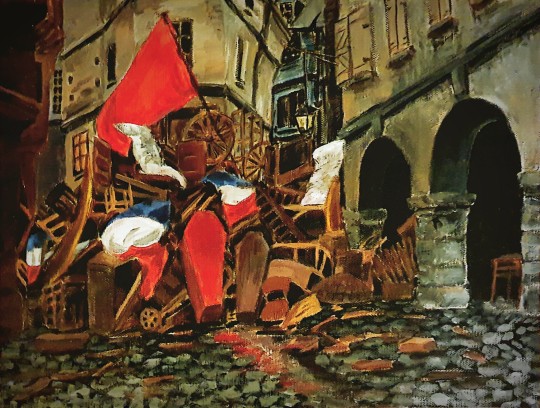
La Liberté ou la Mort! Acrylic on canvas. Somehow managed to exceed my own expectations.
#My art#Les Miserables#Les Mis#Based on the 2012 film set. On that note: I've heard that there's going to be a re-release.#Spent six or seven hours on the damn thing. Would appreciate any and all feedback.
349 notes
·
View notes
Text

Je ne changerai jamais mes amis fantastiques, ma vie merveilleuse, ma famille bien-aimée pour des cheveux moins gris ou un ventre plus plat.
En vieillissant, je suis devenue plus amicale envers moi-même et moins critique envers moi-même.Je suis devenu mon ami…Je ne me blâme pas d'avoir mangé des biscuits supplémentaires, de ne pas avoir fait le lit ou d'avoir raté quelque chose de stupide dont je n'avais pas besoin.
J'ai le droit d'être désordonnée, d'être extravagante.
J'ai vu beaucoup de chers amis quitter ce monde trop tôt, avant de réaliser la grande liberté du vieillissement
Qui m'en voudra si je décide de lire ou de jouer sur mon ordinateur jusqu'à quatre heures du matin et de dormir jusqu'à midi?
Qui me critiquera de rester au lit ou devant la télé aussi longtemps que je le souhaite.
Je vais danser avec ces merveilleux tubes des années 60 70 et 80 et si en même temps je veux pleurer pour un amour perdu …Si je veux, je marcherai le long de la plage en short trop allongé sur
un corps en décomposition et plongerai dans les vagues avec abandon, malgré le regard pénalisant des autres .
Ils vieilliront également.
Je sais que parfois j'oublie, mais il y a des choses dans la vie qui devraient aussi être oubliées. Je me souviens des choses importantes.
Bien sûr, au fil des ans, mon cœur s'est brisé. Mais les cœurs brisés nous donnent force, compréhension et compassion. Un cœur qui n'a jamais souffert est immaculé et stérile et ne connaîtra jamais la joie d'être imparfait.
J'ai la chance d'avoir vécu assez longtemps pour avoir mes cheveux gris et mon rire juvénile gravés à jamais dans les sillons profonds de mon visage. Beaucoup n'ont jamais ri, beaucoup sont morts avant que leurs cheveux ne deviennent argentés.
En vieillissant, il est plus facile d'être positif.
Vous vous souciez moins de ce que les autres pensent.
Je ne me remets plus en question.
J'ai gagné le droit de faire des erreurs. Donc, pour répondre à votre question, j'aime être vieux.
J'aime la personne que je suis devenue. Je ne vivrai pas éternellement, mais tant que je serai encore là, je ne perdrai pas de temps à regretter ce qui a pu être ou à s'inquiéter de ce qui sera.
Et si je le veux, je mangerai un dessert tous les jours. Avec du Champagne.
Que notre amitié ne soit jamais séparée, car elle vient du cœur !
26 notes
·
View notes
Text
Jaune Goes Back To His Roots
Cardin: Oh, so you're the new student at this school? Well, aren't you lucky to be sitting next to me this school year? Please, feel free to give me as many compliments as you want!
Yang: Ugh... There goes Cardin, harassing the new kid again.
Jaune: (Accent) Um, excuse me. I am not from around here, and I do not understand what you are saying.
Cardin: What a plebian you are. It means that you must treat me LIKE A KING.
Jaune: ...Oh!
12 seconds later...
Cardin: I WAS FUCKING KIDDING, YOU PSYCHOPATH!
Jaune: LA LIBERTÉ OU LA MORT!
Pyrrha: Wow, that south Valian guy is really intense!
Yang: I know, right?
Cardin: I'M NOT A KING! I DON'T WANT TO BE A KING!
Ozpin: Your students are about to decapitate Cardin Winchester with a guillotine.
Port: Ho ho! Indeed, they are!
Ozpin: (Sips from his mug)
Port: (Sips from his mug)
250 notes
·
View notes
Text

«Il se disait que la question fondamentale n’était pas: Savaient-ils ou ne savaient-ils pas? Mais: Est-on innocent parce qu’on ne sait pas? Un imbécile assis sur le trône est-il déchargé de toute responsabilité du seul fait que c’est un imbécile?
Admettons que le procureur tchèque qui réclamait au début des années cinquante la peine de mort pour un innocent ait été trompé par la police secrète russe et par le gouvernement de son pays. Mais maintenant que l’on sait que les accusations étaient absurdes et les suppliciés innocents, comment se peut-il que le même procureur défende la pureté de son âme et se frappe la poitrine: ma conscience est sans tache, je ne savais pas, je croyais! N’est-ce pas précisément dans son «Je ne savais pas! Je croyais!» que réside sa faute irréparable?
Alors, Tomas se rappela l’histoire d’Œdipe. Œdipe ne savait pas qu’il couchait avec sa propre mère et, pourtant, quand il eut compris ce qui s’était passé, il ne se sentit pas innocent. Il ne put supporter le spectacle du malheur qu’il avait causé par son ignorance, il se creva les yeux et, à jamais aveugle, il partit de Thèbes.
Tomas entendait le hurlement des communistes qui défendaient la pureté de leur âme, et il se disait: À cause de votre inconscience, ce pays a peut-être perdu pour des siècles sa liberté et vous criez que vous vous sentez innocents? Comment, vous pouvez encore regarder autour de vous?
Comment, vous n’êtes pas épouvantés? Êtes-vous capables de voir? Si vous aviez des yeux, vous devriez vous les crever et partir de Thèbes!»
(Milan Kundera, L’insoutenable légèreté de l’être)
Remplacez "communiste" par "médecin de plateau-télé", membre du comité scientifique, gouvernant, parlementaire, journaliste…
Pour Lacan: «l’erreur de bonne foi est de toutes la plus impardonnable».
13 notes
·
View notes
Text
De l'âme
Une surprise : plusieurs lecteurs, sans doute ébranlés par le vide abyssal qui caractérise notre temps –et avec une inquiétante tendance à l'aggravation– m'ont demandé récemment de “parler de l'âme”. Mais si je me sens très capable de donner un avis –qui n'est que le mien, corrigé par nombre de lectures et d'emprunts– … je tiens à préciser que je suis évidemment tout-à-fait incapable de répondre à la question multiple “Existe-telle ? Quelle est-elle ? Que recouvre-t-elle –ou pas ?”, et surtout de me livrer à cet exercice… en une page “A4’‘ ! Mais quel meilleur moment qu'une Semaine Sainte pour esquisser un début de réponse
Le mot ’'��me” lui-même, tiré du latin (“anima = l'air, le souffle, la vie”), recouvre tant de notions différentes que “ne pas y croire” ne peut avoir aucun sens : qui parle de “croire” à l'air, au ciel bleu, au chocolat… ? S'agit-il de l'Ame des peuples (André Siegfried) ? de l'Ame des choses (Auguste Blondel) ? des “objets inanimés” de Lamartine ? de l'Ame du monde (Frédéric Lenoir) ? (NB : je pourrais continuer longtemps). Ecoutons plutôt Camus : “Ne pas croire à l'âme est une absurdité”.
A ce moment où l'humanité semble “flirter” avec sa chute dans des abîmes qu'on peut craindre définitifs, l'âme –qui était un peu sortie de nos préoccupations consumérisées– semble faire un retour sur le devant de la scène, et nos lecteurs ne s'y sont pas trompés, en m'en parlant. Il faut reconnaître que sa définition a bien varié à travers les siècles : dans l'Antiquité, les grecs en avaient une vision bipartite (“corps et âme”)… alors que pour la tradition biblique, la vision était tripartite (“corps, esprit –pneuma en grec et spiritus en latin–, et âme –psychè, en grec et anima en latin, ce dernier mot animant la vie intérieure et la personnalité, mais aussi ce qui donne vie au corps. Ne ’‘rend-on pas son âme”, au moment du grand départ ? Mais n'allons pas trop vite : avant de la “rendre”, il faut la définir.
Pour les philosophes, l'âme est souvent une notion qui permet de parler de l'être humain dans sa totalité. Pour Platon, l'âme est en conflit avec le corps qui l'emprisonne, alors qu'Aristote insiste sur une conception non dualiste entre “âme” et “corps”, chacun étant plus ou moins indépendant de l'autre. Plus tard, pour le christianisme, qui tient un rôle de toute première importance dans cette “dissertatio” (que je voudrais tellement ne pas être une “disputatio”!), le mot “Ame” veut décrire comment est formé un être humain dans et par ses expériences fondamentales : la vie, l'amour, le désir, la maladie et la souffrance, le questionnement sur “après la vie –ou après la mort”, et l'âme se définit donc comme “autre” que l'esprit : d'un côté, un principe de vie, “ce qui anime le corps”, siège des émotions et des passions, et de l'autre, vie intérieure, et personnalité. On peut dire : raison, ici et liberté, là…
Mais en 1621, Descartes introduit une rupture dans la conception traditionnelle, en traduisant “âme” par “mens” : l'homme est d'abord un être pensant, et le mens latin, qui désigne d'abord le cerveau, l'intelligence, la raison, l'esprit… va peu à peu replacer l'ancienne “âme” au profit de ce nouvel arrivant, le “cogito’' . Une nouvelle logique bipartite est née, le corps et la pensée, séparés mais liés : ’'Cogito, ergo sum”.
Le mouvement phénoménologique, qui se targue d'appréhender la réalité telle qu'elle se donne ou se montre, considère que le corps, seul, joue un rôle (“Le monde n’est pas pour moi autre chose que ce qui existe et vaut pour ma conscience”, écrit Husserl en 1937), ce contre quoi réagit la grande Edith Stern, juive devenue carmélite et morte à Dachau : “On ne peut vivre sans âme, c'est-à dire avec une âme paralysée ou en sommeil’’… phrase où nous retrouvons ce qui est visible tout autour de nous… et ce dont l'humanité est en train de crever
Il fallut attendre 1953 pour que Crick, Watson et Rosalind Franklin, découvrent l'ADN, cette part d'éternité qui est en chacun de nous. Inséparable de nous, elle nous contient tout entiers et nous résume, tout en nous rattachant à nos origines… Question jamais posée mais qui me taraude depuis longtemps : ’'Se pourrait-il que cet acronyme, l'ADN, soit, en fin de compte, le support matériel de notre âme ? Son caractère ’'iso-éternel’'et son identité parfaite avec notre ’'être”, notre “avoir été” mais aussi notre “devoir être”, en font une parfaite réponse à ce que pourrait être ce “Corps glorieux” si difficile à imaginer mais sous lequel, disent les chrétiens, nous entrerons un jour dans notre éternité
En 1979, Joseph Rätzinger, grand théologien et futur grand Pape Benoît XVI, posa (“La Mort et l'au-delà” )que “il n'y a aucune raison sérieuse de rejeter le mot âme , cet outil verbal indispensable dans la foi des chrétiens… ce qui se vérifie à travers la prise de conscience actuelle… que une conscience, justement, ne peut exister sans objet pour la percevoir et sans sujet pour la traduire et l'expliquer”. Et voilà l’ “âme” qui fait à nouveau partie du vocabulaire de la philosophie, le besoin de cet éditorial en étant un début de preuve en soi.
Un dernier point, peut-être : en 2016, l'académicien François Cheng avait écrit un fort beau “De l'Ame” (Albin Michel) où il écrivait “A part le bouddhisme dans sa version la plus extrême, toutes les grandes traditions spirituelles ont pour point commun d'affirmer une perspective de l'âme située au-delà de la mort corporelle : l'âme de chaque être est reliée au souffle primordial qui est le secret de la vie-même. Animée par un authentique désir d'être, elle nous rappelle donc, quelle que soit notre croyance –ou notre non-croyance– combien notre vie participe d'une aventure unique, le Tao –la Voie– qui ne connaît pas de fin, contrairement à la vie”.
J'admets que tout cela n'est pas simple… Mais le moyen, s'il vous plaît, de parler de sujets eschatologiques avec nos seuls mots humains, et en un temps et un espace si réduits ? Par prudence, je vais donc demander à d'autres que moi de conclure. D'abord George Meredith : ’ L'âme est tout, ici-bas; le reste n'est qu'illusio'n’’… Puis Rivarol : “Sans le corps, l'âme n'aurait pas de sensations, mais sans l'âme, le corps n'aurait pas de sentiment”... Libre à ceux qui ont décidé de ne pas y croire, de vivre “sans”. Mais qu'ils ne comptent pas sur moi : je suis si bien, “avec”, surtout en cette Semaine, qui est Sainte pour un bon tiers de l'Humanité.
H-Cl.
12 notes
·
View notes
Text
The only thing that could silence him was death

he was Putin opposition. Navalny was laughing in court 2 days ago and now he’s dead. Navalny was poison, then jailed and now he’s dead. Anyone who thinks Putin will not invade our allies is delusional.

Remember

Family


L'opposant russe Alexei Navalny est décédé le 16 février 2024 dans la colonie pénitentiaire IK-3, située au-dessus du cercle arctique, il purgeait une peine de 19 ans.

En Suisse, quelque 150 personnes se sont réunies place des Nations à Genève, portrait de l’opposant ou bouquet de fleurs blanches à la main. Une femme portait une pancarte « Putin is a killer » (« Poutine est un tueur »).

More people than usual in front of the Russian embassy in Berlin (where there’s a permanent installation counting the victims in Ukraine). Signs say “Putin is a killer” “Putin to The Hague” and “Navalny is dead”
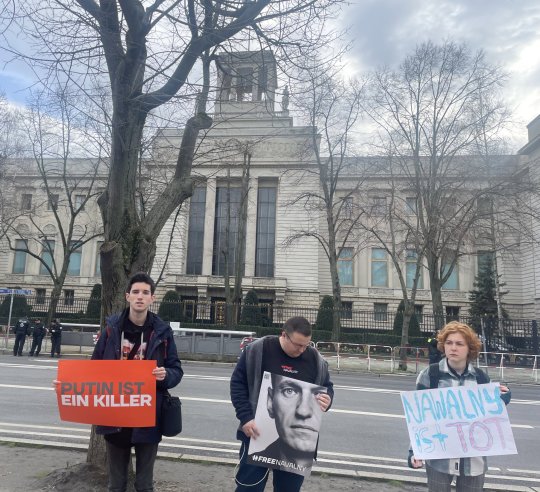
🖤🖤🖤 Alexis Navalny 4 juin 1976 - 16 février 2024 🖤🖤🖤

La mort vendredi dans une prison de l’Arctique du célèbre opposant russe de 47 ans, Alexeï Navalny, a suscité l’indignation en Occident, l’UE pointant la seule responsabilité du « régime russe » et certains pays évoquant un crime de Vladimir Poutine. Il s’est battu pour les valeurs de liberté et de démocratie. Pour ses idéaux, il a fait le sacrifice ultime. Il fut surtout la figure de proue de la condamnation de la corruption du régime. Ses dénonciations des richesses accumulées par Vladimir Poutine et son entourage avaient touché au cœur une réalité qui se terre toujours derrière les dictateurs et les dirigeants fascistes : la corruption. Il la traquait avec des milliers d’internautes, mobilisés aux quatre coins de la fédération. Alexeï Navalny était un militant, très radicalement nationaliste d’ailleurs au début de son parcours. Un opposant déclaré. Un symbole. Pour mesurer la portée de la mort en détention, du principal opposant à Vladimir Poutine, Alexeï Navalny, il faut bien sûr évoquer des conditions de détention inhumaines dans la colonie pénitentiaire de l'Arctique où il purgeait une peine de 19 ans de prison....une région où le mercure descend à - 30°

20 février 2024 Navalny empoisonné au Novitchok ???
17 notes
·
View notes
Text
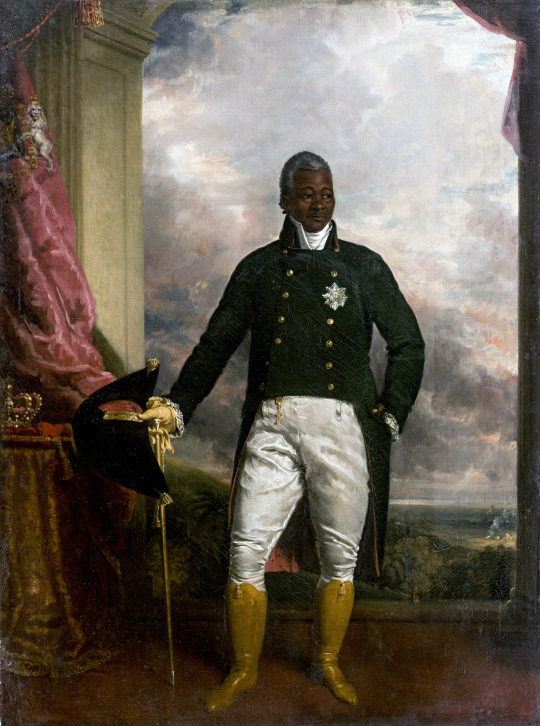
Portrait of Henri Christophe, King of Haiti. By Richard Evans.
#richard evans#king henri christophe#king of haiti#Royaume d'Haïti#henri Ier#Roi d'Haïti#vive le roi#full length portrait#monarquías americanas#Famille Christophe#Roi de l'île de la Tortue#Roi de la Gonâve#monarquias americanas#full-length portrait#dynastie Christophe#Révolution haïtienne#haiti#liberté ou la mort
17 notes
·
View notes
Text
Contemporary descriptions of the hébertist execution compilation
The joy of the people was universal at seeing the conspirators taken to the scaffold. There were the same demonstrations of joy everywhere; a sansculotte jumped up and said: “I would light up my windows this evening, if candles were not so rare.” In the evening, in all the groups and cafes, people talked about the death of these conspirators; the story of their last moments was the only subject of conversation. It was said in several places that Hébert had denounced around forty deputies. It was time, they added, that this conspiracy was discovered, because it was believed in several departments that Paris was under fire. […] According to the comments made on the Place de la Révolution, during the appearance of the conspirators on the scaffold, one noticed that there were people placed to sow trouble. One woman was beaten by another for having made some comment. While the 19 conspirators were being guillotined, the people remained silent; but when Hébert’s turn came, a swarm of hats appeared, and everyone shouted: “Long live the Republic! This is a great lesson for those who are consumed by ambition; the intriguers have done well; the committees of public safety and general security will manage to discover them, and ça ira!”
Tableaux de la Révolution française publiés sur les papiers inédits (1869) by Adolphe Schmidt, volume 2, page 186. ”Situation in Paris 4 Germinal Year 2” (March 24 1794).
The events of yesterday, that is to say the judgment of the conspirators, their journey from the Palace to the Place de la Révolution and their execution, have entirely absorbed the attention and feelings of the people. Everyone wanted to at least see them pass so that they could judge the impression made on their wicked souls by the sight of an immense people, outraged by their crime, and the knowledge of the imminent death they were going to suffer. The crowd of curious people who were on their way or who witnessed their execution was innumerable. [...] Two opposing feelings, indignation against the guilty and joy at seeing the Republic saved by their death, animated all the spectators. One tried to read the faces of the condemned to enjoy, in a way, the internal pain from which they suffered: it was a kind of revenge that they took pleasure in obtaining. The sans-culottes were especially angry with Hébert and insulted him. “He’s damn angry,” said one, “we broke all his stoves (fourneaux).” “No,” said another, “he is very happy to see that the real aristocrats are going to fall under the guillotine.” Others carried stoves? (fourneaux) and pipes and raised them in the air so that they could strike Father Duchesne's eyes. Regardless, this wretch could not pay any attention to what was happening around him; the horror of his situation appalled him; he had reproached Custine for dying as a coward, and he showed no less pusillanimity than him. Momoro put up, as they say, a brave face against bad luck, he pretended to be confident, talked to his neighbors and laughed a wicked laugh. [...] Cloots appeared calm, Vincent lost, Ancart and Ronsin furious and Hébert overwhelmed. The latter was the star of the show, he appeared last [on the scaffold].
Report by the police spy Grisel, March 25 1794, cited in La Liberté ou la Mort: mourir en député (2015) by Michel Biard.
On D-Day, March 24, 1794, an “innumerable crowd” impatiently awaited the execution of Father Duchesne and his accomplices: “Advancing from the place of execution of Paris, one encountered waves of citizens on their way there; everything resounded with the cry of “Father Duchesne to the guillotine!” and in this respect the children acted as peddlers.” Another agent remarks that “in the streets, from the Palace to the Place de la Révolution, the crowds of people were so great that one could barely pass through.” The police estimate (already!) claimed that “perhaps four hundred thousand souls witnesses to this execution.” […] If the legend claiming that Hébert fainted in the tumbril seems false, all reports corroborate on the other hand the moral and physical collapse which this great sermonizer presented: […] “It was noticed that Ronsin seemed the least frightened by his execution, that Anacharsis Cloots had retained great composure, but that Hébert and the others bore on their faces the signs of the greatest consternation;” [Another report states that]: “Of the nineteen culprits dragged to execution, Hébert was the one who presented the saddest and most dismayed face.” Taken from the Palace to the Place de la Révolution amid cries of joy and insults (“Everywhere they passed one shouted “Long live the Republic!,” and threw hats in the air and everyone said some epithet to them, especially to Hébert.”), Father Duchesne was not yet at the end of his troubles. To make the feast complete, a cruel staging allowed him to meditate on his fate: “Upon his arrival on the Place de la Révolution, he and his accomplices were greeted by boos and murmurs of indignation. With each head that fell, the people took revenge again with the cry of “Long live the Republic!” while throwing their hats in the air. Hébert was saved for last, and the executioners, after putting his head through the fatal window, responded to the wish that the people had expressed to condemn this great conspirator to a punishment less gentle than the guillotine, by holding the suspended blade for several seconds on his criminal neck, and throwing, during this time, their victorious hats around him and attacking him with poignant cries of ”Long live this Republic that he had wanted to destroy.” As can be seem, one knew how to have fun in those days. However, as soon as the affair was completed, the agents noted contrasting reactions among the people: “In all public places, the aristocrats and the moderates rejoiced at this execution and affected a lot of patriotism. The patriots also rejoiced, but they observed one another.” [Another report states] “I visited different cabarets near the Gros Caillou, near the Military School. They talked only about Father Duchesne, about whom a thousand stories were made with the intention to bless the Committee of Public Safety for having discovered such a betrayal. I found the little people cheerful”; [Another report states]: “The walks are everywhere full of people and everywhere one stays and asks: “Did you go to see Hébert yesterday?” One answers “yes”. All the faces seem happy.” [Another report states]: “Since Hébert’s death, I have noticed that, in cafés, men who talked a lot no longer say anything.” This is because the execution of Hébert and his supporters, although it purged the Mountain of its extremists, nonetheless shook the people’s confidence in their leaders. Who would believe if even the most ardent patriots could suddenly become traitors? At least one thing is certain, that is that beyond the unconscious dismay which struck the people after the execution, the great cowardice which Father Duchesne demonstrated before the guillotine ended up destroying him in the eyes of everyone: “After the execution, everyone was talking about the conspirators. They said: “They died like suckers”; others said: “We would have thought that Hébert would have shown more courage, but he died as a good-for-nothing.”
Series of police reports found in Paris pendant la Terreur (1962) by Pierre Caron, cited in this blog post.
The execution took place in the afternoon around 5 o'clock, at the Place de la Révolution. A prodigious crowd of citizens filled all the streets and squares through which they passed. Repeated cries of long live the Republic and applause were heard everywhere. These testimonies of the indignation of the People against men who had just so eminently compromised the salvation of the Fatherland, were proportionate to the extreme confidence they had in the art of surprising them; and the public satisfaction whose feeling was mixed with this deep indignation was a new proof of the love of the citizens for the Republic saved by the punishment of these great culprits. Thus perishes anyone who dares to attempt the re-establishment of tyranny!
Gazette Nationale ou Moniteur Universel, number 185 (March 25 1794)
It was 18 of them who suffered the death penalty due to their crimes... It was Father Duchesne, this scoundrel, who was cursed by all the people. If he had been susceptible to remorse, he would have died of shame before his arrival, in front of Madame Guillotine... He was the last to be guillotined, each of the closest spectators continued to reproach him for his villainy...
Letter written by the Convention deputy Ayral Bernard, March 26 1794
Hébert, Ronsin, Vincent, and the other conspiracy defendants whose names and qualities we reported in previous issues, were sentenced to death by the revolutionary tribunal. Only one was acquitted; Laboureau: he was immediately set free; the president of the tribunal embraced him and made him sit next to him: the room resounded with the liveliest applause. The other defendants said nothing when they were sentenced; the Prussian Cloots appealed to the human race, of which we know that he had made himself the speaker. Ronsin wanted to say a few words, he was removed alongside the others. Femme Quetineau declared herself pregnant. Taken back to the Conciergerie, the condemned asked for half a septier of wine and a soup. Around four in the afternoon, they left on three tumbril to go to the execution. Never had an execution attracted such a considerable crowd of spectators; everywhere they passed, one clapped hands, tossed hats in the air, and shouted vive la république ! They seemed quite insensitive to the indignation that was brewing against them: arrived at the foot of the scaffold, they all embraced each other. Hébert, known as Father Duchesne, was the last to be guillotined; his head was shown to the people, and this spectacle provoked clapping of hands and universal cries of vive la république !
Annales Patriotiques et Litteraires de la France, et Affaires Politiques de l’Europe, number 369 (March 26 1794)
The republic has once again been saved: 19 leaders of the conspiracy hatched for its ruin were sentenced to death today, 4 germinal, at half past twelve. The flattering sword of the law struck their guilty heads: these traitors marched towards the scaffold with all the audacity of crime; some laughed, others raised their shoulders: Father Duchène appeared to be neither in great joy nor in great anger; the people applauded and stood in crowds in the places through which the procession was to pass. A lot of cavalry and infantry preceded, accompanied and followed the tumbrils carrying the conspirators: but armed force became useless, because joy was universal.
Le Courier Belgique, number 39 (March 31 1794)
Here is an anecdote which can serve to make better known the eighteen conspirators whom the sword of the law has struck down. On the day of their execution, several heads had already fallen when General Laumur's turn had come. Ronsin and Vincent looked at him at the scaffold and said to Hébert: ”without the clumsiness of this j... f... we would have succeeded.” They were alluding to the indiscretion of Laumur, who would tell anyone who would listen that the Convention had to be destroyed.
Suite de Journal de Perlet, number 555 (March 31 1794)
My father told me that only once, during the Revolution, he found himself stuck in the crowd, without being able to move forward or backward, as the fatal tumbril passed. It was the one who carried the Hébertists. Cloots, placed at one end, said to the spectators: “My friends, please do not confuse me with these rascals.”
Mémoires sur Carnot par son fils (1861) volume 1, page 366.
-
Previous parts of this totally family friendly series:
Contemporary descriptions of the dantonist execution compilation
Contemporary descriptions of the robespierrist execution compilation
#happy 230th deathday guys!!#french revolution#frev#frev compilation#hébert#momoro#no one likes hébert…#like jesus they REALLY hated him
22 notes
·
View notes
Text
On a lighter note, I've created the frev revolutionaries on the Sims 4 and they are very chaotic. So today I give you a pic of Saint-Just with the baby they have adopted (who is called Simon Liberté ou La Mort btw). It's so cute, I wanna cry.

18 notes
·
View notes
Text
Book Recommendations on the French Revolution (the "short" list version)
(For some reason, the original anonymous ask and answer I thought I had saved in my drafts has disappeared? Did I accidentally delete it? Who knows with Tumblr. Anyway, good thing I screenshotted it, I guess.)

Since I am STILL working on my extremely long post series going in depth into recommendations, I guess I should really just answer this ask and give a plain and simple list, as it was requested -_- (Don't worry, the extremely long post series is still going to happen.)
First of all, let’s just say, again (and it really must be insisted on), that most Anglophone historiography is… not very good. There are exceptions, but not many. At least, not enough to satisfy me. Fortunately, some good French books have been translated to English – so that’s great news!
So here are my main recommendations:
Sophie Wahnich’s La liberté ou la mort. Essai sur la Terreur et le terrorisme (2003) which was translated to In Defence of the Terror: Liberty Or Death in the French Revolution with a foreword by Slavoj Zizek in 2012.
This essay basically changed my life, and led me to take the path I have walked since as a historian. Zizek’s foreword is very good in summarizing the ideological oppositions to the French Revolution (until he rambles the way he usually does).
It opens with a quote from Résistant poet René Char which perfectly sets the tone:
“I want never to forget how I was forced to become – for how long? – a monster of justice and intolerance, a narrow-minded simplifier, an arctic character uninterested in anyone who was not in league with him to kill the dogs of hell.”
Keep in mind that when I first read it, in 2003, the very notion of anything like the Charlottesville rally happening was still in the realm of pure fantasy.
Marie-Hélène Huet’s Mourning Glory: The Will of the French Revolution (1997). One of the rare books in my list that was originally written in English (!). I think a lot of it might be available to read via Google Books, but it’s worth buying.
This book is hard to categorize: it talks of historiography and ideology, and it’s overall a fascinating book.
It feels a lot like Sophie Wahnich’s first essay – it was also similarly influential on my research. It inspired a lot of my M.A. thesis. I’ve recently found my book version of it, and this book was annotated like I’ve rarely annotated a book. It was quite impressive.
Dominique Godineau’s Citoyennes Tricoteuses: Les femmes du peuple à Paris pendant la Révolution française (1988) which was translated to The Women of Paris and Their French Revolution (1998).
It’s the best book on women’s history during the French Revolution IMO. I really don’t have much more to say about it: it’s excellent. It talks of working class women, it talks of the conflicts between different women groups, it talks of what happened after Thermidor and the Prairial insurrections, and the women who were arrested. No book has compared to it yet.
Jean-Pierre Gross’s Fair Shares for All: Jacobin Egalitarianism in Practice (1997). You can download it for free via The Charnel House (link opens as pdf).
Another rare book that was originally written in English, and later translated to French, though the author is French! (I think some French authors have picked up that the real battlefield is in Anglophonia…) It’s very important to understand social rights, a founding legacy of the French Revolution.
François Gendron’s essential book on the Thermidorian Reaction: first published in Québec as La jeunesse dorée. Episodes de la Révolution française (1979) (The Gilded Youth. Episodes of the French Revolution). It was then published in France as La jeunesse sous Thermidor (The Youth During Thermidor). As I explained here, its publication history is quite controversial (though it seems no one noticed?). It was thankfully translated to English as The Gilded Youth of Thermidor (1993). However, the English translation follows Pierre Chaunu’s version – which didn’t alter the content per se, but removed the footnotes and has a terribly reactionary foreword – so be careful with that. If anything, that’s a very good example of all the problems in historiography and translations.
Much like Godineau’s book on women, no book can compare. In the case of women’s history during the French Revolution, it’s because most of it is abysmally terrible; in the case of the Thermidorian reaction, it’s because no one talks about it. And it’s not surprising once you start reading about it.
(You might notice that Gendron’s translated book, much like many others, are prohibitively expensive. I do own some of these so if you ever want to read any, send me a message and we’ll work it out!)
Antoine de Baecque’s The Body Politic. Corporeal Metaphor in Revolutionary France, 1770-1800 (1997), which is a translation of Le Corps de l’histoire : Métaphores et politique (1770-1800) (1993). (Here’s the table of contents.) It’s a peculiar book belonging to a peculiar field, and it can be a bit complicated/advanced in the same way most of Sophie Wahnich’s books are, but I still recommend them. See also: La gloire et l’effroi, Sept morts sous la Terreur (1997) and Les éclats du rire : la culture des rieurs aux 18e siècle (2000), but I don’t think either have been translated. Le Corps de l’histoire and La gloire et l’effroi also are nice complements to Marie-Hélène Huet’s book.
If you can read French, I really recommend the five essays reunited in Pour quoi faire la Révolution ? (2012), especially Guillaume Mazeau’s on the Terror (La Terreur, laboratoire de la modernité) – which I might try to eventually translate or at least summarize in English coz it’s really worth it.
The following books are extremely important to understand the historiographical feud and the controversies that surrounded the Bicentennial of the French Revolution in 1989 (and both have been translated to French so that’s cool too):
First, Steven L. Kaplan’s two volumes called Farewell, Revolution: Disputed Legacies (1995) and The Historians’ Feud (1996).
Then, Eric Hobsbawm’s Echoes of the Marseillaise: Two Centuries Look Back on the French Revolution (1990) which gives you the Marxist perspective on the debate. If you want to look for the non-Marxist perspective: look at literally any other book written on the French Revolution and its historiography (I’m not kidding). For example, you can read the introduction by Gwynne Lewis (1999 book edition; 2012 online edition) to Alfred Cobban’s The Social Interpretation of the French Revolution (1964), the founding “revisionist” book.
Again, if you can read French, I recommend Michel Vovelle’s Combats pour la Révolution française (1993) and 1789: L’héritage et la mémoire (2007). I have not read La bataille du Bicentenaire de la Révolution française (2017) but it might recycle parts of the previous two books, so I’d look that up first.
Marxist historiography is near inexistant in Anglophonia, because of reasons best explained in this short historiographical recap on Anglophone historiography and specifically Alfred Cobban (link opens as pdf), but there was Eric Hobsbawm, who wrote a series of very important books on “The Ages of…”:
The Age of Revolution: 1789-1848
The Age of Capital: 1848-1875
The Age of Empire: 1875-1914
The Age of Extremes: 1914-1991
Some of Albert Soboul’s works have been translated as well:
A Short History of the French Revolution, 1789-1799 (1977)
The Sans-Culottes: The Popular Movement and Revolutionary Government, 1793-1794 (1981)
Understanding the French Revolution (1988), which is a collection of various essays translated to English (here’s the table of contents)
While we’re on the subject of classics: I do need to re-read R. R. Palmer’s The Twelve Who Ruled (1941) to see if I still like it, but I believe it’s still positively received? I’ve never actually read C. L. R. James’ The Black Jacobins. Toussaint Louverture and the San Domingo Revolution (1963) but I’m going to rectify that this summer.
That’s a good way to segue into a final part.
Here is a list of books I technically have not read yet (I skimmed through them), but would still recommend because I trust the authors:
Michel Biard and Marisa Linton’s The French Revolution and Its Demons (2021) which was originally published in French as Terreur ! La Révolution française face à ses demons (2020). It looks like an excellent summary of all the controversies surrounding the Terror: Robespierre’s black legend, how the Terror was “invented”, the conflicts between different political factions and clubs, the Vendée, and stats on who actually died by the guillotine (no, there was no “noble purge”). (Here’s the table of contents.)
Peter McPhee wrote several good syntheses, the most recent being Liberty or Death: The French Revolution (2017). Others he wrote: Living the French Revolution, 1789-99 (2006) and A Social History of France, 1789-1914 (1992, reedited in 2004). Why 1914? The 19th century was defined by Hobsbawm (see above) as “the long 19th century” (by contrast with “the short 20th century”), or “the cultural and political 19th century”, which is regarded as lasting from the fall of Napoléon Bonaparte to the First World war.
Eric Hazan’s A People’s History of the French Revolution (2014) and A History of the Barricade (2015), which are translations (Une histoire de la Révolution française, 2012, and La barricade: Histoire d’un objet révolutionnaire, 2013). If you can read French, check out his essay published by La Fabrique: La dynamique de la révolte. Sur des insurrections passes et d’autres à venir (2015).
Just as a final note: this post is the equivalent of four half single-spaced pages in Times New Roman 12 pts. It also took two hours to write and format (and make the side-posts with table of contents) even though most of it is already written in several drafts – i.e. the long post series of in-depth recommendations, so that gives you an idea of why that other series of posts is taking so long to write.
I’m going to go lie down now. -_-
ETA: Corrected some typos and a link that didn't quite go to the right place.
#historiography#frev historiography#sophie wahnich#marie helène huet#antoine de baecque#michel vovelle#michel biard#marisa linton#eric hazan#peter mcphee#c. l. r. james#r. r. palmer#albert soboul#eric hobsbawm#françois gendron#francois gendron#dominique godineau#steven l. kaplan#jean pierre gross#alfred cobban#slavoj žižek#slavoj zizek#this post almost killed me
333 notes
·
View notes
Text
my translation (fr -> chn) of a poem
LOUISE MICHEL, a poem titled "Saint-Just" (1861), after the Archangel.
Source:
Daniel Armogathe and Marion Piper, A Travers la Vie et la Mort (Paris : Maspero, 1982)
路易治•米���尔(1830-1905),代号“安灼拉”,教师、作家、巴黎公社的一员。米雪尔写了一辈子,从小说到散文到诗歌都写,从1871年一直写到了第一次俄囯起义前夕。
《圣茹斯特》这首诗,写在米雪尔三十岁,尚未组入公社时。
※
Louise Michel, Janvier 1861 :
Saint-Just
圣茹斯特
Ombre d'un citoyen, Saint-Just, je te salue !
Viens, frère, parle-moi : l'heure est-elle venue ?
Les Pharaons vont-ils tomber ?
Vois-tu, souvent la nuit, quand l'horizon est sombre,
Je m'en vais en rêvant, et près de moi ton ombre
Se dresse et semble me parler.
一道公民的影子,圣茹斯特,你好哇!
来,兄弟,来告诉我:是那一刻已经到了?
���些法老可要倾覆?
你看,往往在夜晚,地平线暗淡之时,
我做着梦走出来,而我身旁你魂识
出现,似要与我倾诉。
Et nous allons tous deux, moi dans l'ombre indécise,
Toi dans l'éternité ; nous allons, et la bise
Pleure les morts et les proscrits.
Et tout ce qui jadis éblouissait le monde,
La liberté, l'honneur, semble dormir sous l'onde.
Le silence même a des cris.
我们两人一起走,我在犹豫的影中,
你在永恒里:我们走着,干冷的北风
为死者和流民哭号。
而往日中一切曾让世界眩晕之物,
自由,光荣,仿佛都睡在水波的底部。
静寂自有他的绝叫。
Une immense hécatombe, un sépulcre, un repaire,
Voilà ce qu'ils ont fait de la patrie, ô frère.
L'aigle a fondu de son rocher,
Les chacals ont rampé, l'hyène immonde est venue
Et l'on ne voit plus rien sur terre et dans la nue,
L'avenir peut-il abdiquer ?
屠戮一场、坟一座、窝巢一处供藏匿,
他们就把祖囯做成了这样,噢,兄弟。
老鹰弃巨石而飞扑,
豺狼已汹汹横行,肮脏的鬣狗来袭,
从地上到云中再无人能看得明晰,
未来难道可以屈服?
Vois ce qu'ils ont, ces loups, fait de la République ?
Ce peuple au cœur ardent, ce peuple magnifique
Prend pour maître un aventurier ;
Il ne s'éveille plus au bruit de son histoire,
Même sous le fouet ; c'est à ne pas y croire,
Sa honte est à terrifier.
你可看到这狼群对共和囯的所为?
这人民心怀热诚,这人民美丽宏伟
奉投机者为其主宰;
他们不再苏醒于他们历史的声势,
即使备受鞭打;这真让人匪夷所思,
这羞耻该叫人惊骇。
Oh ! Du moins, autrefois, dans vos luttes sanglantes,
Le cœur battait à l'aise, et des ailes géantes
Emportaient votre esprit en haut ;
On pouvait, en mourant sur la place publique,
Crier de l'échafaud : « Vive la République ! »
Oh ! C'était grand et c'était beau !
噢!至少,在从前,你们血腥的战斗里,
心自在地跳动着,有那巨大的羽翼
撑起精神向高处飞;
你们最后上广场赴死时也仍然会
在行刑的高台上疾呼:“共和囯万岁!”
噢!何等雄壮、何等美!
Aujourd'hui, tout se tait ; on entasse dans l'ombre,
Pour qu'ils ne parlent plus, des prisonniers sans nombre,
Car la mort ferait trop de bruit.
Et quand on voit parfois que cette agonisante
Qu'on appelle la France a murmuré, mourante,
Un soupir dans l'affreuse nuit ;
而今天,万物失声;没有编号的囚犯
被挤在阴影里,为教他们不再交谈,
因为死亡震耳欲聋。
当有时我们看见这引人哀惧的
名叫法兰西的将死之人低语着,
叹息在可怕的夜中;
Quand elle a tressailli de honte ou de colère,
L'homme qui la soumet, horrible bestiaire,
Sur elle étend son hideux bras !
Et nous souffrons cela ! Ce néant nous domine !
Le nain pour piédestal a pris une colline
Et nous le regardons d'en bas.
当她因羞耻或因愠怒而瑟瑟发抖,
那迫使她屈服的男人,卑鄙的猛兽,
丑陋的手臂掠过她!
而我们为此受难!这虚无占据我们
侏儒*拿小丘垫脚,自当是坛上的神
我们从下方观望他。
[*侏儒:拿破仑三世。]
Oh ! Vous nous méprisez, vous, ombres magnanimes,
Qui donniez, frémissants de vos désirs sublimes,
Jusqu'à la bonté de vos cœurs.
Vous qui saviez briser dans le fond de vos âmes
Toute faiblesse humaine et qu'on traitait d'infâmes,
Effrayants et saints éclaireurs !
噢!你们厌弃我们,你们,宽仁的影子,
在崇高的期冀中振颤,你们行恩赐
直至献出心底的善。
你们知道如何在你们的灵魂深处
突破一切人性之弱,声名却遭污辱,
可畏而神圣的哨探!
Oh ! Vous étiez bien purs, quoique étant implacables,
Et vous étiez bien grands, apôtres formidables
De l'auguste fraternité,
Or, tandis que mes yeux se remplissaient de larmes,
Une nuit, j'entendis comme un lointain bruit d'armes
Dans le silence répété.
噢!你们如此纯洁,虽也无情顽固,
你们是如此高大,引人敬畏的圣徒,
怀抱着庄严的博爱,
而如今,恰当我双眼被清泪所充盈,
有一夜,却听到了刀枪在远处争鸣,
响彻这单调的静态。
C'étaient eux ! Les géants, les terribles archanges
Qui pour ouvrir la route ont mis dans leurs phalanges
La mort, comme on met un faucheur.
C'étaient eux qui, le cœur saignant sur la victime,
Frappaient le souverain, montrant de loin l'abîme
Aux rois livides de frayeur.
是他们!那些巨人和恐怖的大天使,
他们为开辟道路而在方阵间设置
死亡,像设置镰刀兵。
是他们,心脏在受害者上滴血涓涓,
一边打倒了君主,遥指无底的深渊
吓得诸王面色铁青。
. . . . . . . . . . . . . . . . . . . . . . . . . . . . . . . . . . . . . . . . . . . . .
Comme je regardais cette cohorte sombre,
Un d'eux, s'en détachant, vint près de moi dans l'ombre
Et me tendit ses pâles mains,
Comme les donne un frère après les jours d'absence,
Et je lus dans son âme, au milieu du silence,
L'arrêt terrible des destins.
正当我注视着这黑暗中的一大伙,
其中一位出了列,在阴影中走近我,
苍白的手向我伸出,
像几天前离家,刚回来的兄弟那样,
我从他魂中读到,在寂静的正中央,
命运的恐怖判決书。
Tous deux nous paraissions à peu près du même âge,
Et soit que ce fût l'âme, ou l'air, ou le visage,
Ses traits étaient pareils aux miens.
Et Saint-Just me disait dans la langue éternelle,
« Entends-tu, dans la nuit, cette voix qui t'appelle,
Écoute, l'heure sonne, viens ! »
我们两个人看上去似乎年龄相仿,
而无论是灵魂,还是气质,还是面庞,
我们属同类、站同排。
圣茹斯特用永恒的语言对我说道:
“你可听见,夜深时,这嗓音向你呼叫?
听着,是时候了,快来!”
※
铝硅磷 法译中 共和历二百三十二年 霜月 芦苇日。
note:
Entendre这个词的本义是注意到一件事,更源头的意思是物件延展它的跨度,与它同源(都来自古法语)的是英文的intend。英译这首诗的时候,entendre也许可以被译为hearken。
米雪尔从诗的开头到此处所说的话都有可能是(那些被)圣茹斯特(所代表的革命者们)在说,而不是诗人自己在说。
7 notes
·
View notes
Photo

J’ai divorcé d’avec les Français au moment du confinement. Quand je les ai vus accepter sans broncher d’être parqués comme du bétail. C’est donc qu’ils sont, factuellement, du bétail. En plus, ils sont aussi leurs propres matons, s’accordant scrupuleusement des dérogations de sortie motivées et conformes. Fascinant. À cette époque, je m’amusais à leur faire part de mes nombreuses et longues escapades, moments magnifiques dans un quartier offert au silence, sur les sentiers d’une forêt désertée où toute la faune, usuellement contenue par le passage des ploucs péri-urbains et autres retraités queshuaïsés, sortait de son contenant convenu et débordait sur les chemins, les parkings, les bords d’autoroute. Il fallait voir leurs gueules interdites. Comme si j’avais avoué la préparation d’un attentat ou l’élaboration d’un assassinat. Et pourtant... Il suffisait d’ouvrir sa porte, de marcher, de gagner les bois puis de s’arrêter et d’attendre quelques minutes à écouter tous les oiseaux – c’est à dire ceux que la rumeur humaine laisse habituellement inaudibles – pour apecevoir, loin des ombres forestières, renards et biches, et noter le comportement étonnamment entreprenant des corvidés, bien moins craintifs que d’habitude, employés à réinvestir les lieux à grands renforts de cris perçants et de disputes renouvelées. Pendant ce temps-là, claquemurés chez eux, les Français regardaient les chaînes infos avec leur compteur rouge sang indiquant le nombre de morts en cours. Extraordinaire ! Une mise en scène totalitaire, une pression visuelle constante, un univers sonore saturé de mises en garde, de menaces et d’invectives. Et le masque. Le masque ! Muselière de tissu bleu destinée à faire taire tous et chacun. Distanciation sociale aussi : pas de contact, pas même de frôlement ! Un mètre réglementaire, avec les marques au sol comme dans les dépôts ou les usines ! Et dans la queue aux caisses des magasins, les regards suspicieux à la première toux, au premier reniflement... Je pensais que les gens étaient devenus fous ; ils étaient juste livrés à leurs névroses. On voyait le conditionnement à l’œuvre. On mesurait le champ infini de leurs renoncements. Et je me suis mis à les détester, accrochés à leur bulle existentielle, tétanisés par l’idée de mourir, prêts à tout trahir, tout balancer, dans l’espoir de s’entendre dire “allez, c’est bon, vous allez vivre à nouveau, et tout sera comme avant”. Voix de l’État qui sait tout mieux que vous, qui a barre sur votre volonté, vos divergences, vos doutes raisonnables. La France, et son assourdissant récit révolutionnaire, les combattants de la Liberté, la patrie des Droits de l’Homme, tout ce folklore clinquant montrait avec éclat sa vacuité, son inutilité, son imposture pour tout dire. Les Français se tenaient depuis longtemps éloignés du sacré, à l’abri - pensaient-ils – de toute tentation de transcendance, sans aucune morale autre que républicaine, sans éthique mais avec l’état de droit. Ils voulaient, pour toujours, jouir sans entraves. Ils découvrent maintenant ce que signifie souffrir sans répit.
J.-M. M.
27 notes
·
View notes

